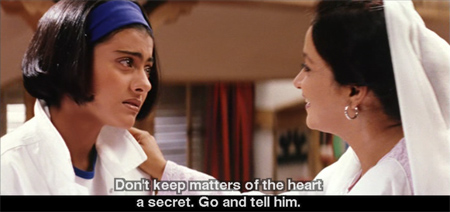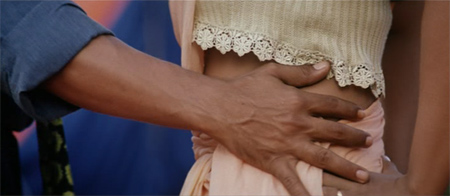Ah, the ’90s: swelling orchestral music, wind machines, flowing chiffons, campy sound effects, foreign song locales, palatial mansions, excess on every front. How I love excess! Especially when it includes Shah Rukh’s twisty almost-crying face. Why is it that he can make that face and I don’t want to toss things at the screen? Why is it that I love this film so very very much? It should annoy me, but it doesn’t. It’s corny and cartoony and shamelessly manipulative, but it tugs at my every heartstring. I always end up awash in tears—and loving every minute of it.
People talk a lot about Dilwale Dulhania Le Jaayenge in context with this movie. I have a confession: I don’t really like DDLJ. What ruins that film for me is that Kajol’s life is completely controlled by the men in it, neither of whom seems very interested in what she might want or need. I just can’t get past that and enjoy the rest. Luckily KKHH contains no such deal-breaker: the people in it mostly behave as I might myself (with the exception of Tina’s ridiculous self-sacrifice in risking her life without including Rahul on the discussion—ugh! how unfair is that?!), and they are all people I wouldn’t mind hanging out with.
The casting has a lot to do with it. There’s no denying the chemistry between Shah Rukh and Kajol, but it’s also there between Shah Rukh and Rani. I have no trouble understanding why Rahul falls head over heels for Tina even though his affection for Anjali is so obvious too.
And poor Anjali! She wins you over right away with her fearless, feisty, warm and generous personality.
But for me the way the story and characters are written is truly what I appreciate. These are real people, and although the settings contain all that 90s excess (and the story too, to some degree), I can relate. I feel involved. I love that the grownups actually have good advice to offer, instead of urging the younger generation on towards some destructive and repressive behavior.
Even if the advice doesn’t work out so well, it’s still solid! And though Tina understands Anjali’s feelings and feels compassion for her, she doesn’t indulge in any fits of self-sacrifice. Anjali herself—although she steps aside—doesn’t do so as an act of sacrifice, but because she knows that Rahul’s feelings for Tina have prevailed over any he might have had for her. (The same holds true, of course, for Salman’s character in the second half.) His confusion, anger and sadness at the train station—oh clueless man!—are very realistic.
There is no curse of the second half in this film, either. In fact, it’s a payoff that really delivers in spades! It builds beautifully on the backstory, and I’ve rarely anticipated anything so eagerly in a film as I did the Rahul-Anjali reunion at summer camp, the first time I saw this. First of course we meet Anjali again, and she’s getting engaged to Aman (Salman Khan). No more the tomboy, she looks effortlessly elegant in her bridal attire! Incidentally it’s also one of my favorite Salman roles, even though it’s only a “guest appearance.”
In any case, I think I hold my breath every time I watch Rahul race across the bridge towards Camp Sunshine and his beloved daughter as well as—if he only knew it—the other Anjali.
How rare a gift is that kind of anticipation in real life—even onscreen or in a book it’s a treat. Shah Rukh and Kajol both describe the reunion scene between Rahul and Anjali as their favorite in the film. If you have even one romantic bone in your body, how can you not just crumble under the emotional weight?
From that point on I dissolve into tears on a regular basis. Watching as they reacquaint themselves with each other, and argue again like they used to—with an adult awareness now, though, of the intimacy implied in that sparring—is just a romantic’s nirvana. (My staple teenaged reading diet was Georgette Heyer, Barbara Cartland and Harlequin Romances, much to my English teacher mother’s disgust.)
There is romance and tension and passion in this to spare—without a single kissing scene!
And at every turn throughout the film is the music by Jatin Lalit. It’s perfect and beautiful, from the lively “Saajanji Ghar Aaye” to the plaintive “Tujhe Yaad Na Meri Aaye” and including the theme song (which fits any mood). The lavish picturizations don’t hurt either!
How I adore this film: bad wigs, weeping children, Johny Lever and all!










